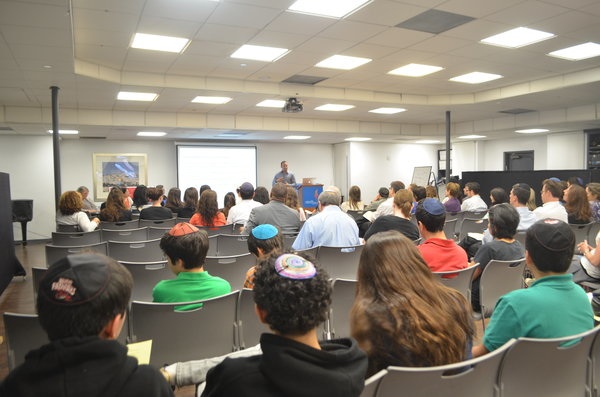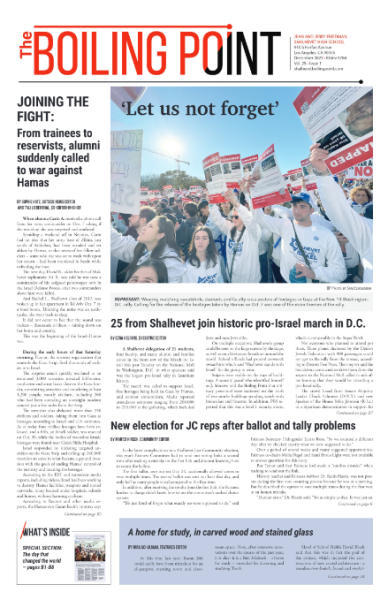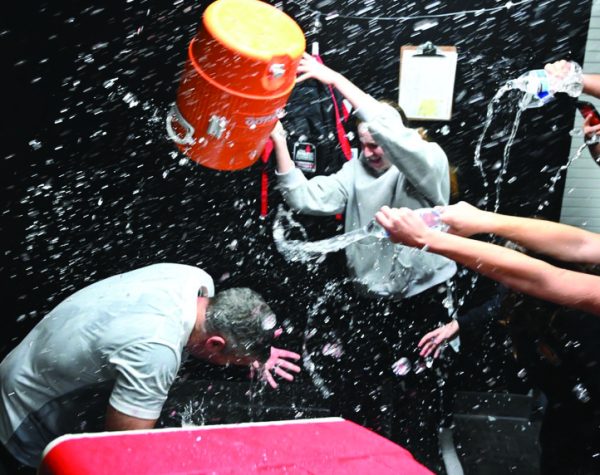School begins replacing APs with new ‘SAS’ advanced courses

BP Photo By Michelle Hirschhorn
NEW: Mr. Danovitch described plans for the Shalhevet Advanced Studies curriculum to parents and students the evening of May 1. A two-year pilot program will begin next year with Advanced Biology and an honors class in European history.
May 22, 2014
Beginning next fall, Shalhevet will begin eliminating Advanced Placement courses in the hope of replacing all of them with advanced courses offering more depth, critical thinking and problem-solving, administrators announced May 1.
Two new courses will kick off the program next fall: Advanced Biology, taught by Dr. Melissa Noel, and “Tipping Point,” taught by history teacher Ms. Tove Sunshine, which will replace AP European History.
Called “SAS” for Shalhevet Advanced Studies, the classes will be graded on a 5.0 GPA scale, as APs are now.
“We are initiating the process now because the timing is right, and we’ve developed a better alternative to the APs,” said General Studies Principal Mr. Roy Danovitch, a longtime AP skeptic.
“Further, the research is so persuasive in our favor. Also it doesn’t hurt to have the enthusiastic support of our college admission director.”
Pending results of a two-year trial, the SAS courses will completely replace APs in the next few years, he said.
The plan was announced at an evening meeting in the Beit Midrash led by Mr. Danovitch and Ms. Aviva Walls, Director of College Counseling. More than 50 parents and students attended.
Also there were Jennifer Fondiller, Barnard College’s Dean of Enrollment Management and Assistant Dean of the College, and Fiona Rees, Senior Associate Director in the Undergraduate Admissions Office at UCLA.
“We will always know how a student is doing in the context of a school,” said Ms. Rees. “Shalhevet is doing exactly what we want. The school is communicating and saying here is how we are changing.”
Mr. Danovitch said AP classes force teachers to teach pre-set material that will end up on the College Board AP Exams at the end of the school year. That prevents them from going into greater depth when students express interest, and it also leaves no time for projects or extra attention to difficult material.
SAS classes would do the opposite, provide hands-on learning and a chance to collaborate and engage in debates about relevant issues. Mr. Danovitch said Biology and History were chosen because school officials were confident Dr. Noel and Ms. Sunshine could create curricula that would be approved as honors classes by the University of California.
The two trial classes will still cover many of the same topics as their AP counterparts but will allow for more flexibility — an opportunity both teachers said they appreciate. They are writing their own syllabi, creating units they feel are the most engaging for students.
“I like that the school is open-minded and that I can build a course the way I want to,” said Dr. Noel, who is just completing her first year at Shalhevet.
“I don’t have to teach to the test because I can select a few topics, such as genetics, and neurobiology, which I wrote my dissertation on.”
“Tipping Point,” replacing AP European History, will focus on all the major Western European countries, but particularly England, in the 16th and 17th centuries, both centuries of major transition in Western Europe.
“I am excited to teach a class that can focus on a dynamic and critical period of time, elaborating the major themes of Euro but being able to develop them in depth,” said Ms. Sunshine.
After the first two courses have been UC-approved, Mr. Danovitch hopes to expand the program over several years to include SAS Calculus, Chemistry, United States History and Statistics.
The Beit Midrash event was designed to explain the changes to parents and students as they were contemplating their course selections for next year.
Replacing APs has been discussed in the past, and one impediment has been uncertainty over whether college admissions committees would think Shalhevet’s education was not rigorous without them.
Mr. Danovitch said AP curricula were often “a mile wide and an inch deep” and that the courses’ reputation had diminished in recent years.
“The research we have conducted has convinced us that this change will significantly improve the competitiveness of our college admission profile,” Mr. Danovitch said, “while allowing us to offer more unique, innovative courses that pique the curiosity of our top students.”
If the SAS two-year trial period succeeds, the school will be moving toward completely eliminating APs, Mr. Danovitch said. In the meantime, AP Government is being eliminated as well.
“The goal is to create courses that are both rigorous and respected by universities,” concluded Mr. Danovitch.
When the presentation was over, some had been convinced while others still had doubts.
“I definitely started out with concerns and a bad attitude,” said Alison Weinreb, mother of junior Adina Weinreb. “But Ms. Walls and Mr. Danovitch reassured us that not only are the new classes going to be as rigorous as the AP courses but maybe even better, instead of just tons of memorizing there will be thinking and discussing.”
Junior Shoshi Miller said the elimination of APs has made course selection for next year more difficult.
“I have been looking forward to taking AP Gov since I was a freshman,” Shoshi said. “Now that it is not an honors course I am discouraged from taking it.”












